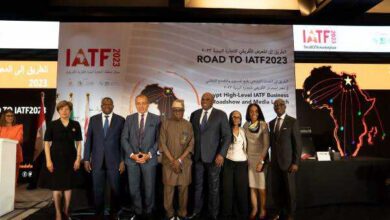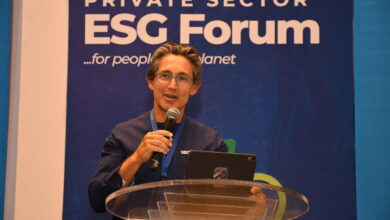Replicate rice production feat in other sectors, Dangote charges CBN
By EDU ABADE and JOHNMARK UKOKO

- As experts canvass robust non-oil export trade, technology to boost Nigeria’s economy
President of Dangote Group, Alhaji Aliko Dangote, has urged the Central Bank of Nigeria (CBN) to replicate its feat in encouraging the production of rice, wheat, dairy and other economic crops to boost non-oil exports in the country.
Dangote, who gave the charge at the seventh edition of Zenith Bank International’s yearly trade seminar with the theme: Unlocking Opportunities in Nigeria’s Non-Oil Export Business, which was held virtually on July 20, 2022, in Lagos, said Nigeria currently imports $2.8 billion worth of wheat and $1.4 billion worth of dairy into the country.
He said: “Cash crops have been major components of non-oil exports and there is room for improvement. Nigeria has abundant varieties of solid minerals, but the sector constitutes only 0.2 per cent of the country’s Gross Domestic Product (GDP).
“We can generate $20 billion from solid minerals, we need a more robust steel industry and so, we should establish an equivalent of the Nigerian National Petroleum Company (NNPC) to hold stake on behalf of the Federal Government.”
He also pointed out that Nigeria’s non-oil exports remained quite low compared to other African top oil producers, adding: “This exposes the economy to oil price and production risks. There is much room for growth and the CBN is helping to drive this through the RT200 programme.”
Read Also: We’re prepared to fight our common enemies – Ondo monarchs
He maintained that the aim of CBN’s RT200 FX programme to achieve $200 billion in foreign exchange earnings from non-oil proceeds in the next three to five years was laudable, stressing that it included enhancing foreign exchange inflows, diversifying the source of FX inflow, increasing the level of contributions from non-oil export, as well as ensuring stability and sustainability of FX flows.
Besides, stakeholders also canvassed support for Nigeria’s non-oil exports sector through collaboration in diversifying Nigeria’s export base through the promotion of non-oil exports and technological innovations.
In his goodwill message and presentation, Founder and Chairman of Zenith Bank Plc, Jim Ovia, highlighted the importance of non-oil export to the nation’s economy, pointing out that Nigeria largely exported cocoa and several other non-oil products for decades before oil was discovered in commercial quantities.
He cited the 25-storey Cocoa House in Ibadan, Oyo State, which was built with proceeds from cocoa exports, pointing out that some countries like Japan and China had been successful because they were doing a lot of innovations, production and manufacturing of goods and services.
“We should also look at promoting the nation’s non-oil export sector through technology to create technological giants like Apple, Tesla and Google. And we already have technology companies in Nigeria, such as Flutterwave, which has a valuation of $3 billion, making it more valuable than some banks in the country.
Speaking further on the enormous potential in Nigeria’s non-oil sector, Ovia highlighted the phenomenal growth of Nigeria’s emerging financial technology (Fintech) companies such as Flutherwave, OPay, Interswitch, Kuda and Paystack, with market valuations of $3 billion, $2billion, $1 billion, $500 million, $200 million respectively, insisting that this underscored the enormous opportunities in the Fintech space.

He also noted that the most capitalised companies in the world, such as Apple, Microsoft, Alphabet (Google), Amazon, Tesla and Visa, among others, were not oil companies, but were operating in the technological innovation space.
Group Managing Director and Chief Executive Officer (MD/CEO) of Zenith Bank, Ebenezer Onyeagwu, said the yearly seminar had served as a veritable platform to deepen the conversation on promoting non-oil export in Nigeria, bringing together non-oil export practitioners and relevant government agencies to interact and explore the opportunities and proffer solutions to the challenges of non-oil export in the country.
On the origin of the seminar, Onyeagwu said the commodity price slump of 2014-2016 was a watershed moment, adding: “When crude oil prices plunged from $114.55 per barrel in June 2014 to $28.76 in January 2016 with an attendant effect on the availability of foreign exchange, the time was ripe to look towards the non-oil export sector for a more sustainable source of foreign exchange not susceptible to external shocks and price volatility.
Highlighting some of the salient outcomes of the past six editions, Onyeagwu noted that the outcomes of previous editions have found expression and influenced policy initiatives, adding: “For instance, the extension of the repatriation period of non-oil export proceeds from 90 days to 180 days and the policy mandating shippers not to carry exports without a Nigeria Export Proceeds (NXP) Form Number, were recommendations from previous seminars.”
Also, the need to incentivize exporters to repatriate their export proceeds through the official channels and the recommendation to create export terminals across various export hubs in the country were from past seminars. Also, previous editions recommended having Export Desks in commercial banks, which has now been instituted.
He also stated that Zenith Bank has trained over 100 exporters through its Zero to Hero programmes, which provide a platform for grooming and exposing beginners to become strong exporters by providing training on documentation, product sourcing, access to market and financing. He noted that Zenith Bank will continue the advocacy of promoting non-oil export.
Delivering his goodwill message, Governor of the Central Bank of Nigeria, Godwin Emefiele, commended Zenith Bank and its leadership led by Ovia for the initiative in organising an annual export seminar to explore opportunities in Nigeria’s non-oil export with the view to increasing the nation’s non-oil export base and ultimately increasing its share as a percentage of total exports.
“This is why the theme of this year’s seminar is timely and appropriate. This is because the global economy and structure are changing rapidly. The previous world economic order underscored by globalisation and seamless trade possibilities seems to be suffering major disruptions lately. We believe Nigeria has a lot of potential and we can harness this for the good of our people and country,” he said.
He pointed out that the CBN had undertaken several initiatives to promote the non-oil export sector, because of its firm belief that the non-oil export sector holds enormous potential to contribute to employment generation, wealth creation and economic growth of the country.
Also, Secretary-General of the African Continental Free Trade Area (AfCFTA) Secretariat, Wamkele Mene, enumerated the progress and achievements of the AfCFTA and efforts to improve intra-Africa trade.
On his part, President Chairman of African Export-Import Bank (Afreximbank), Prof. Benedict Oramah, highlighted the efforts of Afreximbank to enhance intra-Africa trade through implementation of the Pan-African Payment and Settlement System (PAPSS).
He said the PAPSS would make it easy and seamless for Africans to trade and receive payments for goods and services in their local currencies, as well as eliminate the challenges of currency conversion.




